- What is a cloud model for development and deployment?
- What are the main cloud computing models?
- Importance of deployment methods of cloud computing
- What are the five types of cloud deployment models? (overview and comparison)
- Comparison of Cloud Deployment Models: An Overview
- Types of cloud deployment models
- How to Choose Between Cloud Deployment Models?
- Best conclusion of cloud computing
- FAQs

You probably heard about cloud computing, its massive potential, and the positives it serves. Now that you have decided that it can be a great asset and helpful tool in scaling your business, let’s dig in for a brief insight. Choosing the right one among cloud deployment models holds the key to achieving the desired performance, scalability, security, and power for your business.
There are three main deployment models to consider: public, private, and hybrid. Public clouds are offered by third-party service providers who manage and own the infrastructure. These services are delivered over the internet, making them readily available and scalable. Private clouds, on the other hand, are owned and operated by a single organization, typically on-premise within their own data center. This offers a high degree of control and security, but can be less flexible and more expensive to maintain. Finally, hybrid clouds combine elements of both public and private clouds. This allows organizations to leverage the benefits of each model – the scalability and cost-effectiveness of the public cloud for non-critical workloads, and the enhanced security and control of the private cloud for sensitive data or applications. By understanding these deployment models and their unique advantages, you can choose the one that best aligns with your specific business needs and priorities.
Undoubtedly, no single model fits all the solutions. Different types of cloud deployment models exist to solve a variety of problems. Choosing the best cloud model for development and deployment will depend on your business requirements. Through this guide, Idea Usher experts aim to educate you about the best four types of cloud deployment models. Additionally, we look at the advantages of cloud deployment and which is the relevant cloud model for development and deployment for different niches. Hopefully, by the end of this guide, you‘ll have quite a good knowledge of all cloud deployment models. Moreover, this guide should make you ready to take the next step on your cloud journey.
- What is a cloud model for development and deployment?
- What are the main cloud computing models?
- Importance of deployment methods of cloud computing
- What are the five types of cloud deployment models? (overview and comparison)
- Comparison of Cloud Deployment Models: An Overview
- Types of cloud deployment models
- How to Choose Between Cloud Deployment Models?
- Best conclusion of cloud computing
- FAQs
What is a cloud model for development and deployment?
It is vital to know what a cloud deployment model actually is before we dive into the popular cloud computing deployment models.
A cloud deployment model is a narrow layout of environmental parameters such as the accessibility and ownership of the deployment infrastructure and storage size. Moreover, it suggests that the types of cloud model deployment vary depending on who controls the infrastructure and its location.
So, in order to make the most of cloud deployment, an organization should opt for a model that suits it best. To choose the right one for you, you’ll need to analyze your computing requirements. Moreover, you also need to consider networking and storage requirements, existing resources, and business motives. Understanding the pros and cons of cloud deployment models is also necessary for making a decision.
Let’s dive in deep!
Advantages of cloud deployment
Cloud computing provides a lot of benefits to your business. For instance, it provides the option to essentially set up a virtual office. Also, you get the much-needed flexibility of connecting to your business anywhere, at any time. Additionally, with the rising number of web-enabled devices configured currently, quick access to your data is even easier.
There are many benefits of utilizing cloud deployment models for your business:
Reduced IT costs
Shifting to cloud computing may considerably decrease the cost of managing and maintaining your IT systems. You need not buy and install expensive systems and equipment for your business. With cloud deployment, you can easily eliminate your costs by accessing the resources of your cloud computing service provider.
Scalability
You can scale up or scale down the operation and storage needs of your business rapidly as per your situation. Additionally, cloud deployment allows flexibility as your needs change. Utilizing the cloud for scaling takes away all your worries and frees up your time so you can concentrate on doing business.
Business continuity
Securing your data and systems is a vital aspect of business continuity planning. Suppose you experience a hardware breakdown, power failure, or other crisis; having your data stored in the cloud is a necessity. Moreover, it ensures that data is backed up and protected in a secure and safe location.
Collaboration efficiency
Collaboration in a cloud platform provides your business the flexibility of information sharing as well as communicating.
The pandemic of Covid-19 took made social distancing and remote working a norm. Suppose you are working on a project from remote locations. In that case, could utilize cloud computing to serve employees, contractors, and third parties with access to the same files.
The flexibility of work practices
Cloud computing provides high flexibility to employees with respect to work practices. You can effortlessly access the data and your work platform from your home. So it doesn’t matter if you are on holiday or on the way to and from work. Cloud computing allows you to work and access data from anywhere.
What are the main cloud computing models?
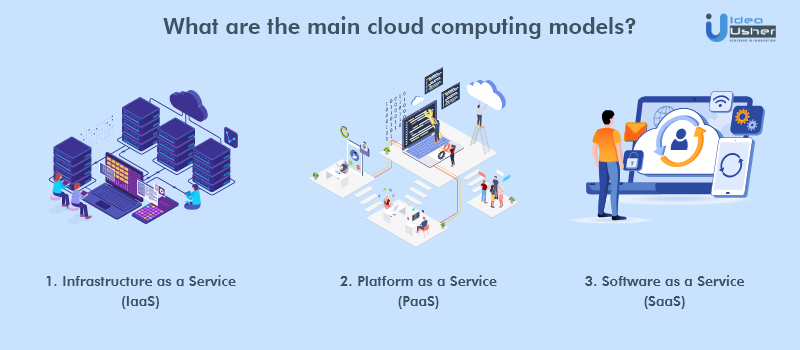
Cloud computing is usually offered as three different service packages. Each of these serves an executive set of business requirements. These three models are essentially known as:
- Software as a Service (SaaS),
- Platform as a Service (PaaS), and
- Infrastructure as a Service (IaaS)
Let’s dig a bit deeper into each of these cloud computing models, how they work, and what they have to offer.
1. Infrastructure as a Service (IaaS)
Infrastructure as a Service (IaaS) cloud service is a self-service model for leveraging the infrastructures of remote data centers.
- IaaS offers virtualized computing provisions through the Internet.
- IaaS is generally hosted by a third party, such as Amazon Web Services, Microsoft Azure, or Google.
- The main Idea is; that instead of your company buying and installing hardware, you can simply purchase IaaS based on a consumption basis.
- It is much like paying for electricity. You only pay for how much you use.
- Moreover, this model allows organizations to add, delete, or reset on-demand IT infrastructure.
- Numerous IT organizations depend on IaaS simply as they are more familiar with the model.
- Additionally, if companies possess years of experience with virtual environments or strict security and regulatory requirements; that can only be met through IaaS.
2. Platform as a Service (PaaS)
Platform as a Service (PaaS) allows organizations to run, build, and manage software applications without actually buying the IT infrastructure. That further makes it easier and faster to develop, test and deploy applications. Developers can now focus on coding and creating applications without any worries about time consumption. IT infrastructure activities such as real-time servers, storage services, and backup are effortlessly accessible. PaaS adds up more value to the cloud. Moreover, it can decrease your management stress and turn down costs. This cloud computing model also eases up the opportunity to innovate. With PaaS, you can efficiently scale your services on demand anytime. Some examples include AWS Elastic Beanstalk and Windows Azure.
3. Software as a Service (SaaS)
Software as a service (SaaS) is an alternative to traditional on-device licensed software with a subscription. SaaS is centrally hosted in the cloud. A great example is Salesforce. Almost all SaaS applications can be accessed directly using a web browser. Additionally, SaaS can be accessed without any downloads or installations. However, some SaaS applications require plugins. Some examples of SaaS cloud providers include BigCommerce, Google Apps, Salesforce, Dropbox, and MailChimp.
Importance of deployment methods of cloud computing
Cloud deployment models avail a competitive advantage to businesses and boost overall productivity. Various cloud computing models are emerging frequently.
Organizations now want to use cloud deployment strategies to manage operational challenges
Let us now discuss in brief the five major types of cloud deployment models.
What are the five types of cloud deployment models? (overview and comparison)
1. Private Cloud
The private cloud deployment model is a proprietary environment dedicated to businesses. The computing power and storage of this model are stretched through the incorporation of virtual components. Moreover, these virtual components can be placed at the vendor’s data centers or the organization’s premises. A private cloud delivers a very good security level and control. Therefore, an organization can configure and manage the environment with respect to its business requirements.
2. Public Cloud
The name says it all. Public cloud deployment models are publicly accessible. Additionally, these models in the cloud are ideal for businesses with rising and fluctuating demands. It makes a great choice for organizations with minimal security concerns too. Therefore, a cloud service provider charges you for networking services, virtualization & storage service on the public internet. Public cloud deployment is also a great delivery model for teams with development and testing. Its configuration and deployment are quick and easy, making it an ideal choice for test environments.
3. Hybrid Cloud
A hybrid cloud deployment model avails the positives of both private and public clouds with additional proprietary software. The applications can be hosted in a highly safe and secure environment. This environment is very cost-efficient and needs less implementation time.
4. Community
The community cloud deployment model functions similarly to the public cloud. However, one difference lies– it allows access to only a specific set of users who share common objectives and use cases. This class of cloud deployment model is operated and hosted either by a third-party vendor or internally. Moreover, you can choose a combination of all three too!
5. VPS
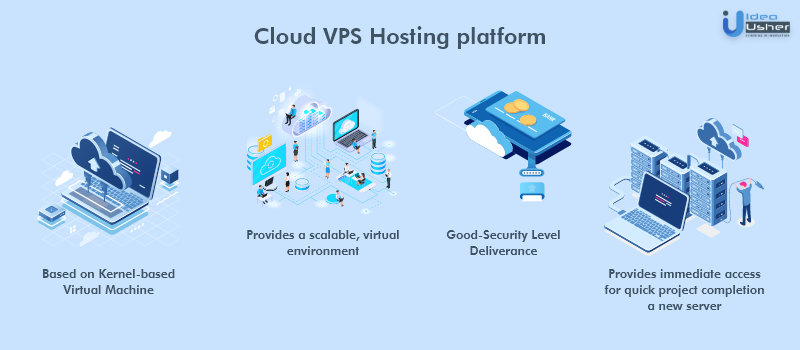
The Cloud VPS Hosting platform is another proprietary cloud computing solution. VPS is primarily based on KVM, which is Linux’s Kernel-based Virtual Machine. It leverages virtualized, scalable services that can be purchased on a utilization basis. Moreover, you pay for what you use.
VPS provides a scalable virtual environment. Additionally, it serves resources required for most projects within minutes. It does so by providing immediate access to a new server. Another decent benefit is: you can access this without migrating your data or altering settings on your server.
Comparison of Cloud Deployment Models: An Overview
| Public | Private | VPC | Community | Hybrid | |
| Ease of setup | Set up is quite easy as the service provider does most of the work | Comparatively hard to set up. Your company people create the system | Again easy to set up; the service provider does most of the work | Configuration is easy due to community practices | Configuration is difficult due to interconnected systems |
| Ease of use | Considerably easy to use | Complicated and requires an intrinsic team | Easy to use | Relatively easy to use as members help solve problems | Difficult to use if the system was not set up properly |
| Data control | The service provider has all control, so there is low control over the data | The user owns the system, so high control | Low, as the provider possesses control power | High in case the members | Very high (with the right setup) |
| Reliability | Prone to failures and outages | High (with the right team) | Prone to failures and outages | Depends on the community | High (with the right setup) |
| Scalability | Low, most providers offer limited resources | Very high as there are no other system tenants | Very high as there are no other tenants in your segment of the cloud | Fixed capacity limits scalability | High (with the right setup) |
| Security and privacy | Very low, not a good fit for sensitive data | High enough, ideal for corporate data | Very low, not a good fit for sensitive data | High (if members collaborate on security policies) | Very high as you keep the data on a private cloud |
| Setup flexibility | With little to no flexibility, service providers usually offer only predefined setups. | Very flexible | Less than a private cloud, more than a public model | With little flexibility, setups are usually predefined to an extent | Highly flexible |
| Cost | Very Inexpensive | Very expensive | Affordable | Members share the costs | Cheaper than a private model, pricier than a public one |
| In-house hardware demand | No | In-house hardware is not a must but is preferable | No | No | In-house hardware is not a must but is preferable |
Types of cloud deployment models
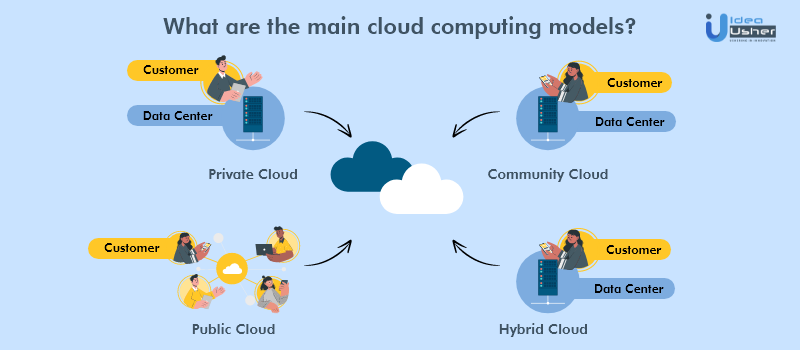
#1 Private
Introduction
Private cloud deployment, as the name suggests, is not available to the general public. Only one specific company owns a private cloud. Additionally, it is also called an internal or corporate deployment model due to its privacy.
- It is possible to host the server externally or on the premises of the owner company.
- The physical location doesn’t really matter. These infrastructures are majorly handled on a designated private network.
- The infrastructures utilize software and hardware that are intended for use only by the owner company.
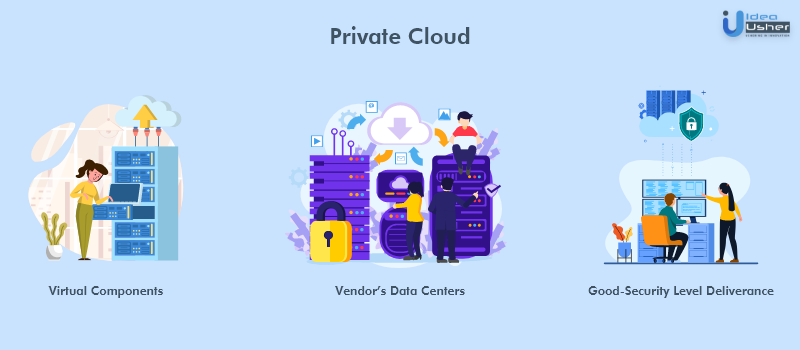
Pros of a private cloud model
The majority of the benefits of this deployment model are due to its autonomy. Some of the benefits are the following:
- Customized and flexible development
- High scalability
that further allows organizations to customize their infrastructures in accordance with their requirements
- High security
- Privacy and
- Reliability
as only authorized users can access resources
Cons of a private cloud model
The major disadvantage of the private cloud deployment model is its cost, as it requires considerable expense on hardware, software, and staff training. That is the main reason why a secure and flexible cloud deployment model is not a suitable choice for small companies.
#2 Public
Introduction
Service providers
- own the server infrastructure,
- manage it and
- overlook the pool resources.
Therefore, the need to purchase and maintain their own hardware does not arrive for service-seeking organizations. The payment models for public cloud deployment services offered by provider companies consist of a freemium model. In other words, you get only basic services for free, and the premium ones are paid (obviously, because how else the service provider is supposed to sustain)? Moreover, users can raise or drop cloud resources depending on the requirements that are mostly fluctuating.
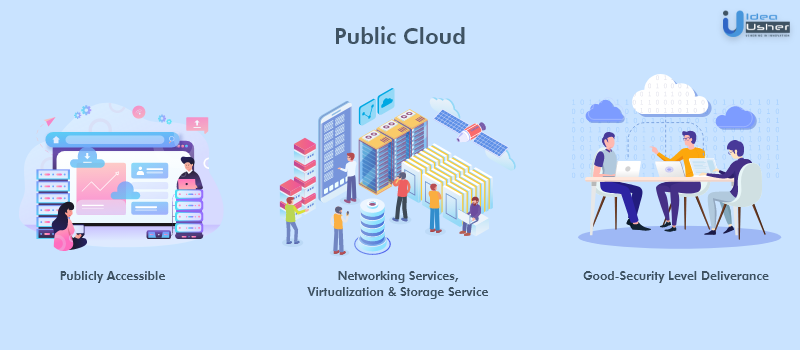
The public cloud deployment model is undoubtedly the prior choice for organizations without any privacy concerns. Moreover, some of the popular public cloud deployment models include Amazon Elastic Compute Cloud (Amazon EC2), Microsoft Azure, IBM Cloud, Salesforce Heroku, Google App Engine, and others.
Pros of a public cloud model
- Effortless infrastructure management.
- The facility of a third party handling your cloud infrastructure is convenient:
- You really aren’t required to develop and maintain your software (Why? Because the service provider does it for you)
- The infrastructure setup and use are easy and hassle-free.
- High scalability: It is quite smooth to extend the cloud’s capacity as your company requirements rise.
- Extensively reduced costs: This model is the fairest. You pay only for the cloud service you access overall. Hence, there’s no need to invest huge capital in IT resources.
- 24×7 uptime: Your service provider’s huge infrastructure is constantly available and has therefore improved operation time. It is vital to keep your website/app up and to run it all the time to make it globally accessible.
Cons of a public cloud model
- Compromised reliability: That same server network is also meant to ensure against failure but often enough, public clouds experience outages and malfunction
- Data security and privacy issues raise multiple questions of concern. The data is easily accessible, but a public deployment model prevents users from knowing where their data/information is stored and who can access it.
#3 Hybrid
Introduction
We all know what the term ‘hybrid’ refers to. It is basically a blend of two different types of resources. In this case, a hybrid cloud is nothing but a combination of two or more cloud models. Additionally, each cloud model in the hybrid cloud operates varyingly; still, it is part of the same architecture. Interestingly, the internal or external providers can offer resources in a hybrid cloud deployment architecture.
We hope that wasn’t too technical; even if it was, let’s break it into a more sane way (We all know techies are a bit of … leave it).
- A company protecting its critical data will prefer storing it on a private cloud,
- The less sensitive data can meanwhile be stored on a public cloud.
- The hybrid cloud is also commonly used for ‘cloud bursting’.
- It basically means: suppose an organization handles an application on-premises using their own IT infrastructure. Now, if there’s a heavy load, they can anytime ‘burst’ into the public cloud.
Pros of a hybrid cloud model
- Cost-Effectiveness – The end service cost of a hybrid solution is lesser since it majorly utilizes the public cloud for storing data.
- Security – The proper segmentation of data optimizes the chances of data theft from attackers is significantly reduced
- Flexibility – With higher flexibility, organizations can develop custom solutions that satisfy their requirements optimally.
Cons of a hybrid cloud model
Complexity – It is complex configuring hybrid cloud architectures. Moreover, it needs to integrate more than one cloud architecture.
Specific Use Case – A very exquisite feature of this model is that it basically makes more sense for organizations having multiple use cases. Additionally, this works even if you need to separate critical data from raw data.
#4 Community

Introduction
The community cloud runs in a way that is similar to the public cloud. The only difference is that it allows access to only a specific set of users (who follow common objectives and use cases). Additionally, this type of cloud deployment model is handled and hosted internally or via a third-party provider. Moreover, one can also opt for a combination of all three deployment models.
Pros of a community model
- Cost reduction
- Enhanced security,
- High privacy and reliability
- Effortless sharing of data
- Hassle-free collaboration
Cons of a community model
- High cost compared to the public deployment model (every model costs higher than a public cloud)
- Fixed amount of storage and bandwidth capacity
- Still not normally used
How to Choose Between Cloud Deployment Models?
According to Statista, In 2021, around 67 percent of service seekers were using Microsoft Azure for their cloud services. Another interesting thing is Amazon Web Services (AWS) topped the list until 2020 when Microsoft grabbed the first place
There is no single cloud deployment model that fits every development approach and requirement. Moreover, organizations must choose a model depending on the expected workload.
- Priorly, you need to assess your needs and consider the kind of execution your application requires.
- Keep in mind your business goals as well. What is it that you want to achieve?
- Try to understand that your requirements may fluctuate over scenarios and with time.
Here are a few aspects you can consider before making the decision:
- Ease of Use – How savvy and technically trained are your resources? Do you have the time, team, effort, and money to put them through training?
- Cost – How much can you spend on a deployment model? Moreover, how much can you fulfill upfront on subscription, maintenance, updates, and other models?
- Scalability – What is the status of your current activity? Does your system even lead to high demanding situations?
- Legal– Are there any specific laws or regulations in your nation/region that can impact the execution? What are the industry standards that you must stick to?
- Privacy – Have you established strict privacy regulations for the data you gather?
Also read: Detailed comparison of Oracle Cloud and AWS
Best conclusion of cloud computing
Undoubtedly, each cloud deployment model has an exclusive service offering and can immensely add value to your business.
- For small to medium-sized businesses: a public cloud can work ideally to start with.
- Further, as your requirements develop, you can easily switch to another deployment model.
An effective deployment strategy can be developed relying on your needs using the above-mentioned cloud deployment models. Do you have an app development idea in mind but are concerned about deployment? Well, all your worries end right here, as Idea Usher has got your back! We offer comprehensive app development solutions for all your needs. Starting from analysis to deployment and maintenance, and further, even the marketing of your product will be covered by us. Contact us for your app development and get a quote soon!
FAQs
Q. What is a community cloud example?
A fantastic example of a community cloud is the U.S.-based dedicated IBM SoftLayer cloud developed for federal agencies. Moreover, only governmental entities collaborating over common characteristics like security and privacy concerns can use this platform.
Q. Which environment is used to deploy private clouds?
“Cloud Computing” environment is most suitable for deploying private clouds, especially for critical workloads. On the other hand, a public cloud is generally used to host less critical workloads. Additionally, this cloud computing environment is now becoming more and more popular in the digital platform. It is in demand on both industrial and personal scales.
Q. What are the major success factors for deploying cloud computing?
- Technical: Technical capability refers to physical assets (such as computers, network equipment, and databases). Additionally, it also represents collective resources that provide an organization the ability to function along with a flexible, scalable layout.
- Managerial: The chances of an organization executing a new system successfully rely on its managers’ ability to collaborate the activities associated with the implementation effort
Relational: Relational capability represents an ongoing partnership between the IT manager and the cloud provider. Here, the vendor should have a clear understanding of how cloud services are advantageous for the client organization.








Vivek Badani